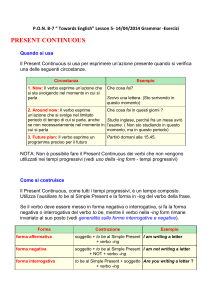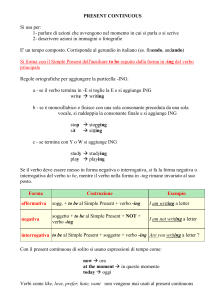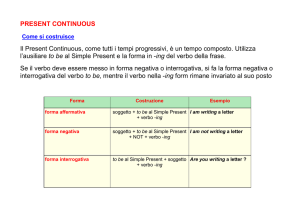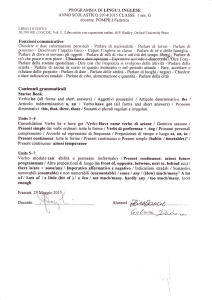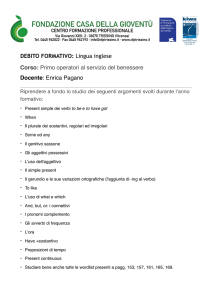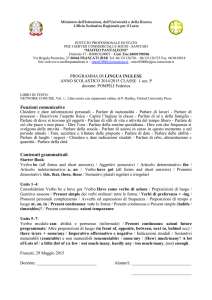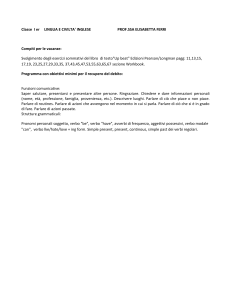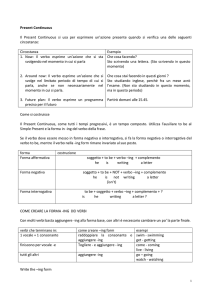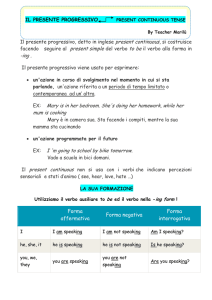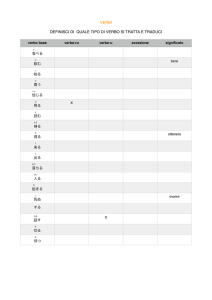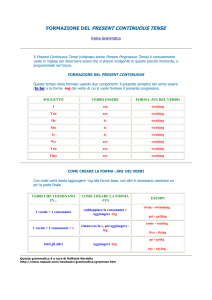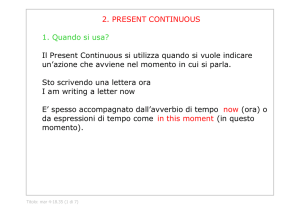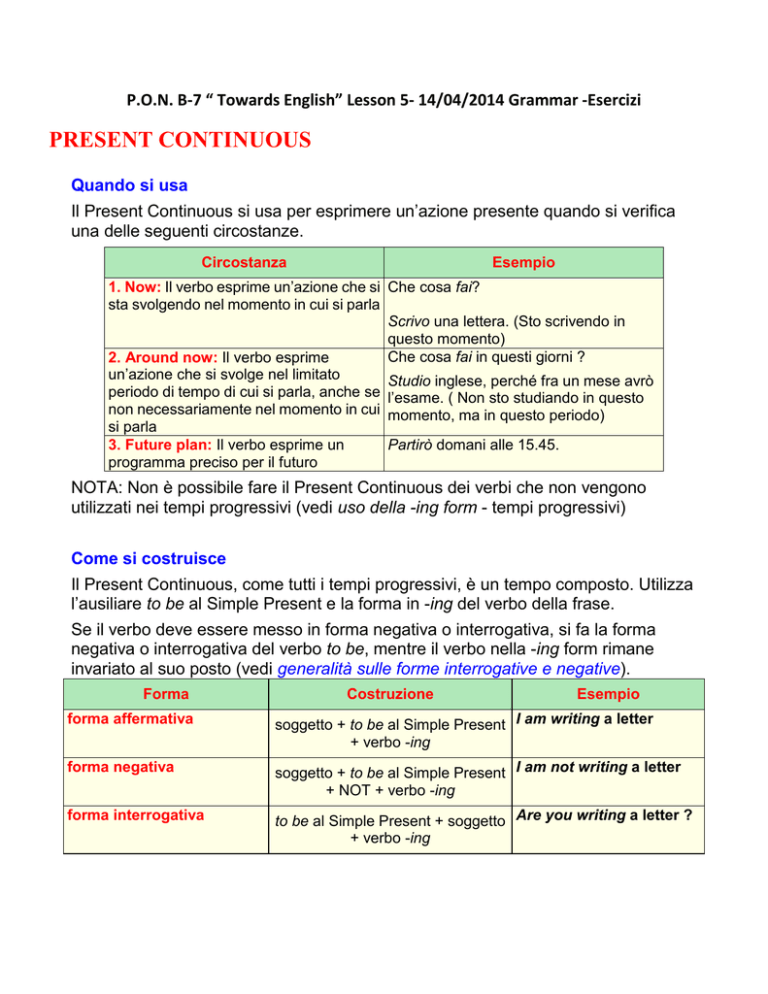
P.O.N. B-7 “ Towards English” Lesson 5- 14/04/2014 Grammar -Esercizi
PRESENT CONTINUOUS
Quando si usa
Il Present Continuous si usa per esprimere un’azione presente quando si verifica
una delle seguenti circostanze.
Circostanza
Esempio
1. Now: Il verbo esprime un’azione che si Che cosa fai?
sta svolgendo nel momento in cui si parla
Scrivo una lettera. (Sto scrivendo in
questo momento)
Che cosa fai in questi giorni ?
2. Around now: Il verbo esprime
un’azione che si svolge nel limitato
Studio inglese, perché fra un mese avrò
periodo di tempo di cui si parla, anche se l’esame. ( Non sto studiando in questo
non necessariamente nel momento in cui momento, ma in questo periodo)
si parla
Partirò domani alle 15.45.
3. Future plan: Il verbo esprime un
programma preciso per il futuro
NOTA: Non è possibile fare il Present Continuous dei verbi che non vengono
utilizzati nei tempi progressivi (vedi uso della -ing form - tempi progressivi)
Come si costruisce
Il Present Continuous, come tutti i tempi progressivi, è un tempo composto. Utilizza
l’ausiliare to be al Simple Present e la forma in -ing del verbo della frase.
Se il verbo deve essere messo in forma negativa o interrogativa, si fa la forma
negativa o interrogativa del verbo to be, mentre il verbo nella -ing form rimane
invariato al suo posto (vedi generalità sulle forme interrogative e negative).
Forma
Costruzione
Esempio
forma affermativa
soggetto + to be al Simple Present I am writing a letter
+ verbo -ing
forma negativa
soggetto + to be al Simple Present I am not writing a letter
+ NOT + verbo -ing
forma interrogativa
to be al Simple Present + soggetto Are you writing a letter ?
+ verbo -ing
ESERCIZIO SUL PRESENT CONTINUOUS
BEGINNERS
Make correct sentences using the PRESENT CONTINUOUS
1) “Where’s Tom?” - “He (play) tennis with Sarah”.
♥ ”Where’s Tom?” - “He’s playing tennis with Sarah”.
2) “Have you written the letter?” - “No, I (write) it now”.
♥ ”Have you written the letter?” - “No, I’m writing it now”.
3) She (not do) her homework, she (read) a book.
♥ She isn’t doing her homework, she’s reading a book.
4) They (work) at the moment?
♥ Are they working at the moment?
5) Let’s go out! It (not rain).
♥ Let’s go out! It isn’t raining.
6) I don’t like your friends, they always (complain).
♥ I don’t like your friends, they’re always complaining.
7) My brother (not wait) for the bus, he (go) on foot.
♥ My brother isn’t waiting for the bus, he’s going on foot.
8) At the moment we (plan) our future work.
♥ At the moment we’re planning our future work.
9) She (see) her grandparents next weekend?
♥ Is she seeing her grandparents next weekend?
10) Why they (not do) their homework?
♥ Why aren’t they doing their homework?
2. ESERCIZIO "TROVA L'ERRORE"
Find the mistake in each sentence and correct it
1) In Rome it don’t rain very much in summer.
BEGINNERS
GB
GB
♥ In Rome it doesn’t rain very much in summer.
2) The woman siting next to me on the plane was very nervous.
♥ The woman sitting next to me on the plane was very nervous.
3) Do you look at that man in the street?
♥ Are you looking at that man in the street?
4) Shh! Can you hearing that voice?
♥ Shh! Can you hear that voice?
5) You doesn’t seem satisfied.
♥ You don’t seem satisfied.
6) Don’t put the pen away. I use it.
♥ Don’t put the pen away. I’m using it.
7) At the moment Nora paints in her attic.
♥ At the moment Nora is painting in her attic.
8) Stella work’s in a shoe shop near the park.
♥ Stella works in a shoe shop near the park.
9) English coffee is just being wonderful!
♥ English coffee is just wonderful!
10) They talk about the problem right now.
♥ They’re talking about the problem right now.
3. SU PRESENT SIMPLE E CONTINUOUS
INTERMEDIATE
Put the verb into the correct form (present simple or continuous)
1) “How
(to be) your French?” “Not bad. It
♥ ”How is your French?” “Not bad. It’s improving”.
2) Look! The train
♥ Look! The train is leaving!
(to leave)!
3) The train
(to leave) at 9 o'clock.
♥ The train leaves at 9 o’clock.
(improve).
GB
4) “What time
(you/get) up in the morning?”“I usually
♥ ”What time do you get up in the morning?” “I usually get up at 7.”
5) If you
(to study), you'll pass your exam.
♥ If you study, you’ll pass your exam.
6) The man we met yesterday
♥ The man we met yesterday is on TV!
(to be) on TV!
7) The young man
(to paint) a beautiful picture!
♥ The young man is painting a beautiful picture!
8) I must go now. It
(to get) late!
♥ I must go now. It’s getting late!
9) This room
(to smell). Let's open the window.
♥ This room smells. Let’s open the window.
10) Don't go out, it
(rain).
(to get up) at 7.

